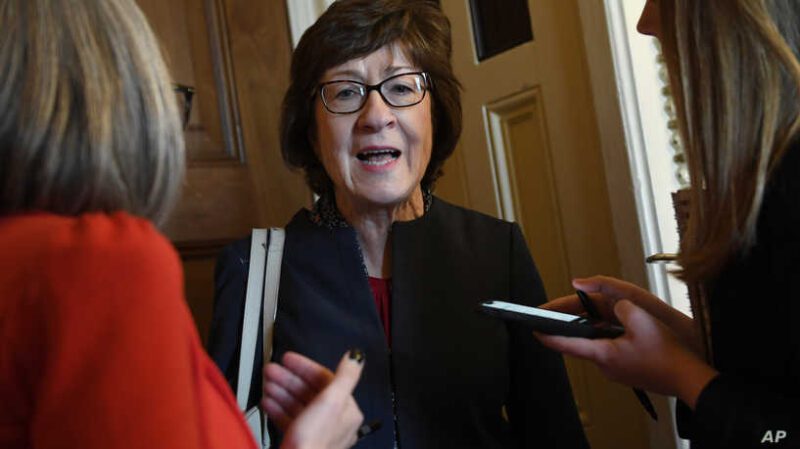Though the 2020 election is still 18 months away, speculation abounds over whether U.S. Sen. Susan Collins (R-Maine) will be re-elected again – and who might be lining up from right, left and in-between to unseat her.
It’s a momentous race for Collins, the state of Maine and our country. Having served in the Senate for nearly a quarter century, she’s now Maine’s elder stateswoman on the national stage. But that stage has changed markedly in recent years, as has Collins’ role – and, in many cases, the ways her audience – the voters – view her performance.
Pundits and pols already are trying to predict the trajectory of this race because its outcome has enormous ramifications for both Maine and the country, potentially shifting the balance of power in the upper chamber. (Collins and Colorado Republican Cory Gardner are seen as key must-have pickups if Democrats hope to retake majority.)
No question, it’s early. “Only an idiot would write about it at this point,” veteran Maine political observer and columnist Al Diamon (who of course has done some advance prognostication of his own) quipped to Pine Tree Watch.
So far, the list of real and imagined candidates runs the gamut from an interesting lineup of longshot, registered challengers to free-associating speculation about others.
For example, Wikipedia includes horror novel master and Bangor resident Stephen King among its list of potential candidates for Collins’ seat. (The speculation appears to be sourced to an off-handed 2017 comment by former Gov. John Baldacci.)
I know she’s been going around the country raising money. I don’t tend to like to predict, but it does look to me like she’s running.”
— Amy Fried, professor and chair of the University of Maine political science department
But as actual opposing candidates begin to declare, perhaps the question that needs answering first and foremost is whether Collins herself will even run. She’s widely assumed to be a candidate, of course, and has been actively raising money. But political winds can change, as she knows well.
The most recent comments on this subject from Collins herself were from January, when she said it was her “intention” to run. In another interview that month, she promised to “make a final decision toward the end of this year.”
A Collins spokesperson reached last week said that those press statements are the most recent reflection of the senator’s thinking on the subject.
“If she doesn’t run, this is a whole different race,” says Diamon. “And I think there’s still a reasonable chance she won’t run. I talk to people all the time who say it’s certainly on the table. A year ago, I would have said the chances were about 60-40 that she would run. Now, I say it’s more like 55-45.”
“She’s taken a lot of heat from both sides. The chances of arriving at compromises in Congress have decreased. The possibilities of accomplishing much of anything in the next six years look slim to none. Retirement has got to be tempting. Also, ex-senators don’t get owned by SNL.”
Abrupt exits have been known to happen
It’s not as if a surprise retirement would be without precedent. In 2012, U.S. Sen. Olympia Snowe (R-Maine) stunned her constituents and the political world by opting not to pursue a sure-thing reelection bid. At that time, Collins was “devastated” by her close colleague’s decision.
Snowe’s reasons for retirement – vicious partisan rancor on Capitol Hill, fading influence for the type of classic moderate New England Republicanism she once embodied, fewer friends and allies in the GOP caucus – were logical.
Those trends have only gotten worse and more pronounced in the years since. Collins, the last New England Republican left on Capitol Hill, finds herself in the national media crucible during nearly every close Senate vote. So perhaps she, too, is tiring of the drama.
Consider some recent history. With one momentous vote, she is (literally) cheered at home as returning hero after joining with Sen. Lisa Murkowski (R-Alaska) and the late Sen. John McCain (R-Arizona) to torpedo what may have been the GOP’s last best chance to repeal Obamacare.
Mere months later, with another vote – supporting the confirmation of Supreme Court Justice Brett Kavanaugh – she is vilified and targeted with nationwide fundraising efforts to help secure her defeat.
A balancing act
So Collins has a fine line to walk as a self-described moderate, trying to stay in the good graces of her home-state constituents, her political party and a president all too happy to aim his Twitter flamethrower at anyone who crosses his path.
It’s possible that “she will pull an Olympia Snowe and say, ‘No, I’m not going to do it,'” says Diamon.
The uncertainty makes handicapping the election ahead that much more difficult.
“An open Senate race in Maine would probably be a total toss-up, or might even lean to the Democrats depending on the candidates and the overall political environment,” says Kyle Kondik, managing editor of Sabato’s Crystal Ball, a campaign and election newsletter and website that predicts election outcomes. The site, coordinated through the University of Virginia Center for Politics, classifies Maine as a “Leans R” state.
“Snowe’s retirement in 2012 helped save the Democratic Senate majority that cycle; a Collins retirement would boost Democrats’ odds of taking the Senate in 2020,” adds Kondik, who followed an interview with Pine Tree Watch with an interesting and illuminating Twitter thread handicapping the potential trendlines of the race.
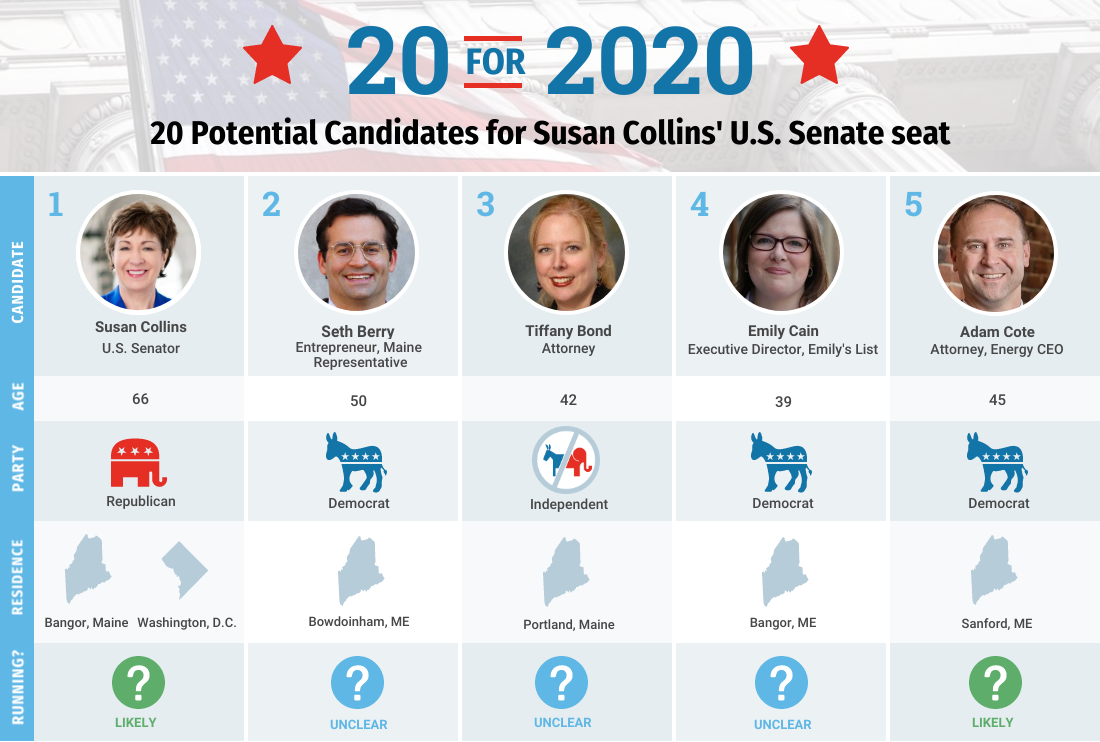
The likely scenario – for now
Most signs point to Collins being inclined to defend her seat.
“At this point it certainly looks like she’s running,” says Amy Fried, professor and chair of the political science department at the University of Maine. “I know she’s been going around the country raising money. I don’t tend to like to predict, but it does look to me like she’s running.”
Collins may face primary challengers, but she’d obviously be the candidate most heavily funded by the national GOP, as the party looks to defend its Senate majority with all resources at its disposal.
And Collins has drawn plenty of support herself, already amassing a $4 million warchest. And amazingly, less than 1 percent of that money is from Maine residents.
Here’s what we are up against: Susan Collins has about 500k followers on Twitter alone.”
— Independent Tiffany Bond, a Portland attorney
But her Democratic opponent will have some substantial money to work with too – thanks in part to a crowdfunding campaign that gained steam after Collins’ controversial vote to confirm Kavanaugh. That fund has topped $3.8 million, much of it donated by “from-away” progressives.
The effort was launched by the Maine People’s Alliance and Mainers for Accountable Leadership, alongside progressive activist and ALS patient Ady Barkan, after their efforts to persuade the senator away from a pro-Kavanaugh vote came up short.
“The confirmation of Brett Kavanaugh to the Supreme Court Justice is a threat to all Mainers,” according to the campaign website. “Kavanaugh is committed to ending healthcare for people with pre-existing conditions. He is committed to overturning Roe v. Wade. His confirmation poses a danger for millions of families in Maine and across America.
“For failing to stand up for the people of Maine and ignoring the voices of your constituents, and for endangering the lives of millions of Americans, we will work to elect a new senator to represent the state of Maine. Every dollar donated to this campaign will be used to fund your eventual Democratic opponent in 2020.”
The Collins camp and some election watchers have questioned the crowdfunding campaign’s legality. But there’s no question that, in the days following Kavanaugh’s confirmation, Collins – who until then had been at least somewhat palatable to many liberals – found herself the focus of intense anger from Democrats nationwide.
Left-leaning Twitter was inflamed, with Democrats declaring their vows to defeat her, either by voting against her or funding her opponents. Some even thought out loud about opposing Collins themselves, including former National Security Advisor Susan Rice, who garnered headlines across the country with a two-letter tweet in response to a question asking who wants to run against Collins: “Me.”
It might have been easy last fall to convince oneself – especially if you were a liberal activist from out of state with little appreciation for the nuances of Maine politics – that, thanks to one vote too far, Collins’ proverbial goose was cooked. The reality, of course, is more complicated. For example, Rice, who had said Collins’ Kavanaugh vote “betrayed women across the country,” has since confirmed that she’s not running.
Vulnerable in way she hasn’t been before
While there are limits to what national energy, and even outside funding, can bring to this race, the fact is that Collins is the most vulnerable she’s ever been in politics.
There’s no question that plenty of left-leaning Mainers are ready for a major change. Especially since the onetime savior of the Affordable Care Act did a heel-turn, just a year later, to help cement a conservative majority on the Supreme Court by voting for the most controversial high-court nominee since Clarence Thomas in 1991.
With control of the Senate at stake and the Democrats searching for viable Republican targets, it stands to reason that they will target Collins more seriously this year than they did in, say, 2014 …”
— Kyle Kondik, managing editor of Sabato’s Crystal Ball
“In some ways, maybe her future is tied to what Kavanaugh does – deciding votes on abortion cases or Affordable Care Act cases,” says Fried. “I think a decision from Kavanaugh that was seen negatively in the state would hurt her.”
Indeed, some now see a Supreme Court reckoning on Roe v. Wade happening sooner than had been expected, perhaps even before the 2020 election.
“The polling I’ve seen so far still indicates that Collins retains a lot of her past crossover strength in the state, and she has won easily the last three times she has been on the ballot,” says Kondik.
“But with control of the Senate at stake and the Democrats searching for viable Republican targets, it stands to reason that they will target Collins more seriously this year than they did in, say, 2014, when they were playing much more defense nationally,” he says.
It seems 2020 could be the year that Susan Collins, after more than two decades of relative goodwill from Maine voters, faces a reckoning at the polls. Still, the power of long incumbency is significant. And Collins has usually done well when it comes to constituent services.
She has a relatively strong base of support statewide – although not as strong as it used to be, especially in the 1st Congressional District. And despite major frustrations with her from Democrats and, to a lesser extent, many Republicans, most national pollsters still count Maine as a good lean-GOP bet.
“I think that she’s got to pay closer attention to this race than anything in recent times because she’s had some erosion in her Republican base,” says Diamon.
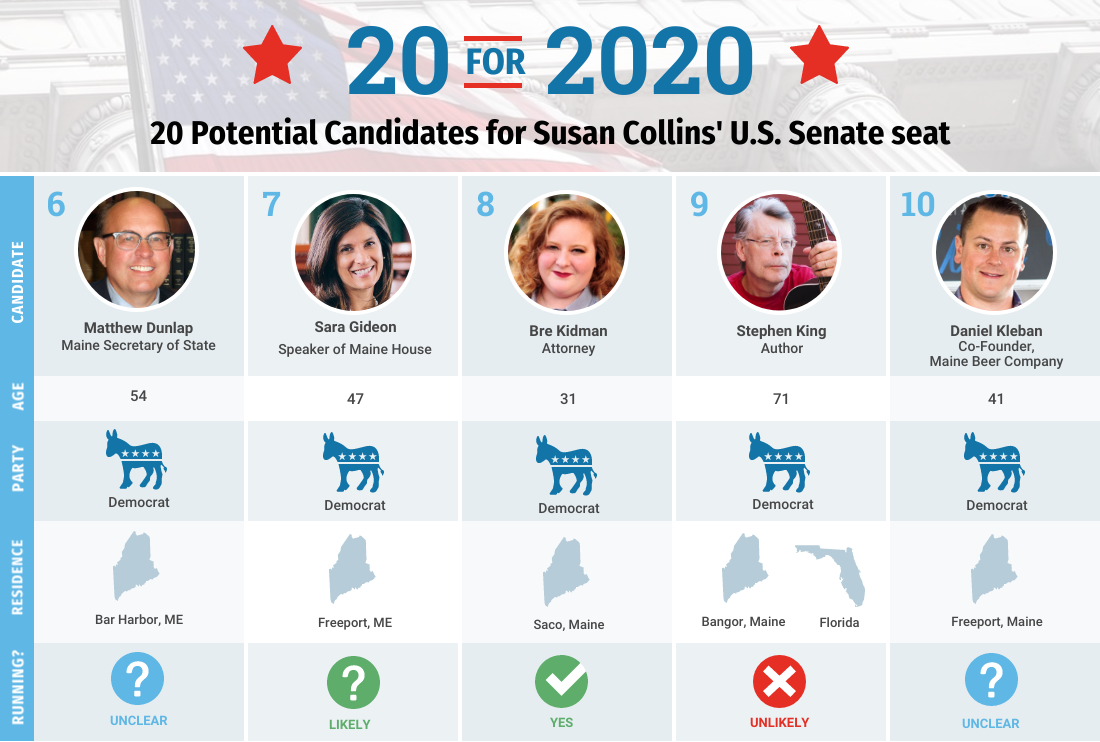
The times they have a-changed
The political climate has significantly changed since Collins’ first Senate election in 1996. It’s even changed since her most recent win in 2014, when she painted all 16 Maine counties red and cruised to re-election with 68 percent of the vote.
And it has changed substantially since she took Kavanaugh’s words of reassurance about Roe v. Wade at face value. That was the last straw for many Mainers who already were bothered by a string of recent votes that didn’t jibe with her “moderate” reputation and by her “Trump Score” (how often her votes have been in line the president’s positions) of nearly 72 percent.
“I think there is more dissatisfaction than at any other time – certainly from Progressives, especially women, but also from conservative Republicans who are angry about her votes on healthcare and the (immigration) emergency,” says Sandy Maisel, a government professor at Colby College, referring to her opposition to President Trump’s attempt to declare a national emergency over the U.S.-Mexico border wall.
“These have been very trying and emotionally draining times for Senator Collins, but also the time in which she has had the most influence in the Senate,” he adds.
Indeed, her swing-vote influence comes with potential risk for her re-election campaign: Between now and Election Day 2020, there’s a strong possibility that Collins “will be forced into more tough votes,” says Maisel.
Depending on how tough and controversial, those votes could “either push her into retirement or push this to a toss-up race” says Maisel. “If she retires, it will Lean D. Though a LePage re-entry would make this very interesting.”
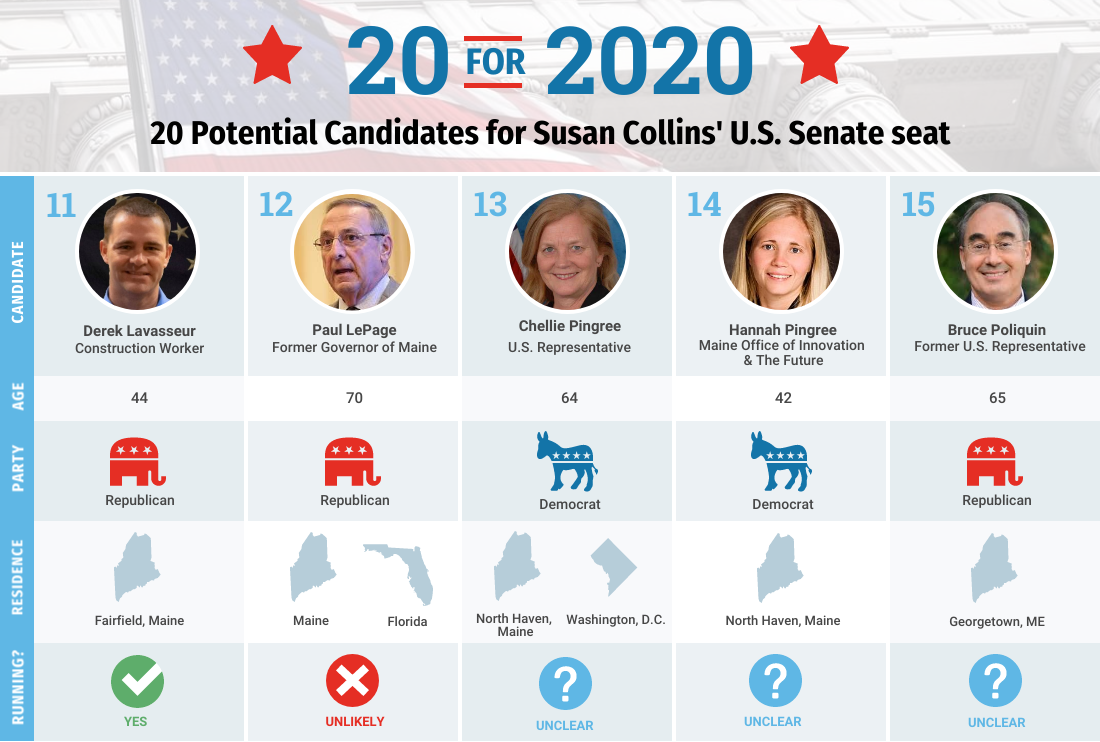
Here he comes again … maybe
Now there’s an interesting thought. It’s been mere months since former Gov. Paul LePage traded Augusta for Florida. Could he stage a return so soon? Could his calls to WGAN and WVOM be hints that he craves more Maine politics? He has publicly criticized Collins on multiple occasions, after all. Might he mount a primary challenge?
“Paul LePage, as a potential primary challenger, would be a problem for Collins, but I doubt he would run,” says Diamon. “And he doesn’t seem to know what state he lives in.”
While at least one Republican candidate, Derek Levasseur – a conservative blogger and construction worker from Fairfield – has already pledged to oppose Collins, not too many have indicated designs on a challenge from the right.
“I cannot see who among the Republicans would challenge her, nor even who would run if she decides not to,” says Maisel. “I guess in that case you might see LePage move back to the state or (former Republican U.S. Rep. Bruce) Poliquin run for Senate instead of going back after (Democratic U.S. Rep. Jared) Golden. But I do not see either of them challenging her in a primary.”
Whoever decides to run, there’s an interesting wrinkle coming for 2020 ballot-casting: “Nominations will be by ranked-choice voting, so others might see themselves as likely to be consensus second or third choices,” says Maisel.
That fact means that candidates and voters should think hard about the political calculus of challenging an incumbent, even if her statewide support has softened.
“It’s not going to be something where you can get out with a very narrow percentage,” says Fried, the UMaine political science professor.
“You have to also be someone who’s going to attract some other voters,” she explained. “So a very right-wing Republican, say, would have to be someone who could also build consensus with the other side. And same with Democrats: a left-wing choice would have who would have to be more broadly acceptable. That’s a big deal.”
Who else is considering a run?
Though few Democrats have yet announced, plenty are mulling it over. Early speculation seems to be focused on a 2020 race between Collins and one of a handful of Democrats, including state Rep. Sara Gideon (D-Freeport), who is Maine’s Speaker of the House, attorney Adam Cote of Sanford, runner-up in the 2018 gubernatorial primaries, and Maine Secretary of State Matthew Dunlap (D-Bar Harbor).
U.S. Rep. Chellie Pingree and her daughter, former Maine House Speaker Hannah Pingree, also have been mentioned by multiple pundits.
These have been very trying and emotionally draining times for Senator Collins, but also the time in which she has had the most influence in the Senate.”
— Sandy Maisel, Colby College government professor
“For the Democrats, Sara Gideon seems the obvious choice,” says Maisel. “Adam Cote is getting a good deal of pressure to run again as well. A Pingree candidacy would not surprise me – Chellie, not Hannah, who I assume is waiting for her mother to retire to run for that (Congressional) seat.”
Diamon says Cote is “probably the strongest possible Democrat because he can gain some traction in the Second District.” But there’s a caveat there: “He’s run for office twice, and he’s really good at finishing second.”
Maisel says he’s “a big Cote supporter, and he has name recognition and can raise money – but Gideon will be hard to beat.”
Diamon isn’t so sure. “Sara Gideon? I’ve got to guess four out of five Mainers have never heard of her.”
As for the rest of the Democratic field, whether declared or rumored, “I just don’t see anybody at this point that looks like they can beat her,” he says.
“I look at the (potential) candidates and see people who are totally untested,” Diamon explains, offering Maine Beer Company co-founder Daniel Kleban, rumored to be ruminating on a run for office, as one example.
“He makes great beer, but he’s never run for anything. And running for the U.S. Senate is really not a novice job. Too many people do that who have just no clue what it’s about. It’s a statewide race. You’re going to deal with really complex issues and you need to know what you’re doing.”
The official field is small
Just a handful candidates have actually declared. The first to throw her hat in the ring was Danielle Ravyn VanHelsing, a Sangerville transgender activist who has been funding her Independent campaign with a can-and-bottle drive – a fiscally frugal strategy that also has environmental benefits. “Even if it just cleans up the trash, I’d be happy,” she explains.
There’s Levasseur on the Republican side. “I’m not running against Sen. Collins out of resentment,” he said in announcing his candidacy. “I’m running for the people – for common people.”
Saco attorney Bre Kidman, the first Democrat to join, says she jumped in the race because so few others from her party have taken the plunge. “Maine deserves more than a career politician in the Senate,” she says. “Change is coming.”
And then there’s Portland attorney Tiffany Bond, who last fall ran as an Independent for the District 2 Congressional seat eventually won by Golden. She hasn’t officially declared. But recently, she has been publicly pondering – mostly via her fast-growing Twitter presence – a second independent race, this one against Collins.
Imagining the “most crowd-sourced campaign possible,” Bond is seeking to capitalize on social media exposure, networking and fundraising potential to build her own grassroots base.
“Here’s what we are up against: Susan Collins has about 500k followers on Twitter alone,” she explained in an April tweet. “She has access to near-unlimited financial resources. Susan has a very favorable relationship with the media (particularly local) and can get any TV/radio/newspaper coverage she wants.”
Bond has pioneered what she calls #MaineRaising, which eschews campaign contributions in favor of small donations to Maine businesses, farmers, schools, artisans and other local organizations.
In recent months, driven by dozens of tweets per day, her follower count has risen to more than 42,000 people, from all corners of the United States and beyond. By one site’s metrics, she’s added more than 11,300 followers over the past month.
“If you are frustrated with Susan Collins, and I certainly am as a constituent, know that all the snark, complaining, and criticism will not get her out of office. It just won’t. We could spend $50 million on attack ads, and she will win.”
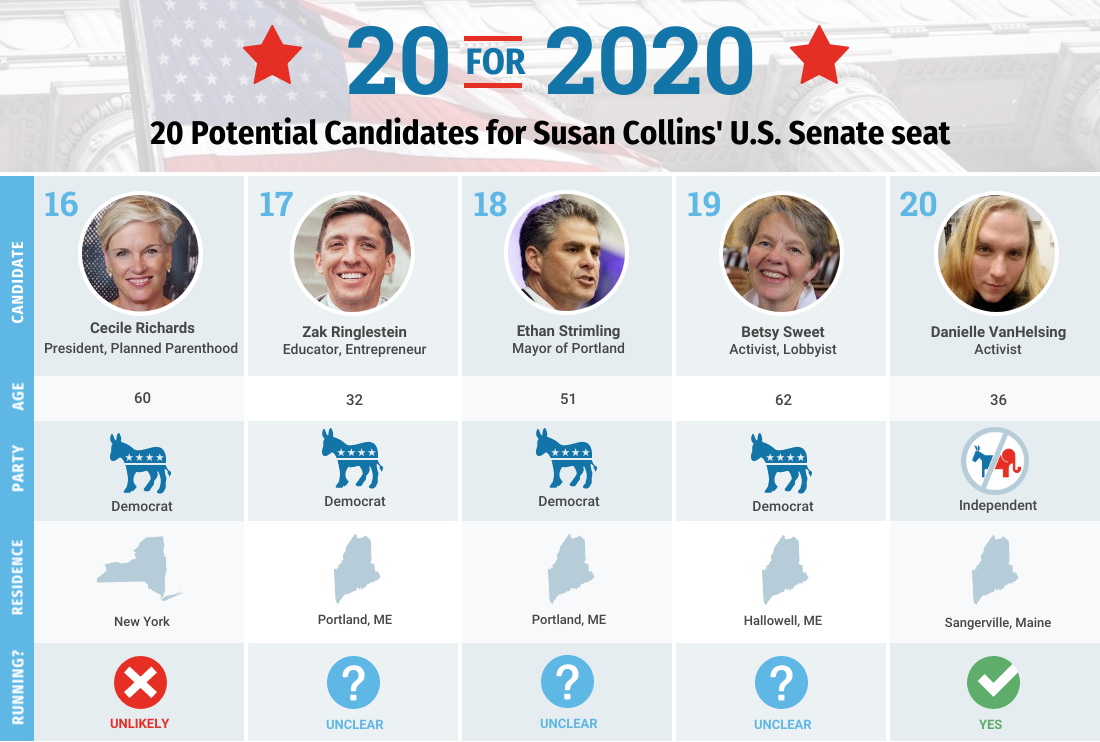
One longtime observer’s assessment
Diamon offers his provocative perspective on some of the other rumored candidates:
“Chellie Pingree? There aren’t eight votes for her in the 2nd District,” he says of Maine’s 1st District representative. Of Pingree’s daughter Hannah, who now heads the new Maine Office Policy Innovation and the Future, he says: “She has the same problem as Chellie. She’d be an attractive candidate if she had enough money, but there’s no way I can see her beating Collins.
“Betsy Sweet (the Hallowell-based activist, attorney and former candidate for governor) made some noise that she might run but I don’t think that’s going to happen,” he adds. “Seth Berry (of Bowdoinham, who represents District 55 in the Maine House) made noise like he might run, and I think in a Democratic primary he might appeal to the extreme left wing. But in a general election, he would have real weaknesses.”
I think that she’s (Susan Collins) got to pay closer attention to this race than anything in recent times because she’s had some erosion in her Republican base.”
— Al Diamon, longtime Maine political columnist
Diamon continued, mentioning the 2014 and 2016 Democratic 2nd District Congressional candidate: “Emily Cain? She’s the only person in the history of politics to lose an election to Bruce Poliquin. ‘Nuff said. And she did it twice!” As for a more recent national Democratic candidate, who came in a distant third in the effort to unseat popular Independent U.S. Sen. Angus King: “Zak Ringelstein? I believe he finished behind Eric Brakey in his last U.S. Senate race, and that’s kind of a bad sign for anyone.”
“I have Ethan Strimling on my list, because he says he definitely isn’t going to run but if he wins another term as mayor, I think he will,” Diamon adds. “But he has no constituency outside of Portland.”
Those comments may seem dismissive, but they suggest some of the challenges of running a statewide race and getting winnable numbers of votes from both of the “Two Maines.”
For Democratic hopefuls, “you run down a long list of people and nobody there looks like a serious threat” to Collins, says Diamon.
“That’s always a big issue for Democrats,” adds Fried. “If you’re going to win statewide you have to do at least pretty well in the Second District. You don’t have to win the Second District overall, but you have to cut the margins. And I think we saw that with (now Gov. Janet) Mills, certainly.”
That said, “who knows where things will be in November 2020,” she says. “Polls are just snapshots, but that most recent one did have Trump a little underwater in the Second District. By like three points. So if it’s relatively close, but Trump is behind, that probably is somewhat helpful to a Democrat.”
Also, notes Kondik, “the trick for Democrats will be getting Democratic presidential voters to also vote for their Senate candidate. That’s assuming the Democratic presidential candidate carries Maine, which is not a sure thing – Hillary Clinton only won it by three points. If Donald Trump carries Maine, Collins is totally safe.”
No denying that longevity counts
Collins, over her 25-year career in the Senate, has done well appealing to voters in both districts – and in both parties.
“Obviously, she has been around for a long time, and she’s won quite strongly in the past,” says Fried. “Last time she got almost 70 percent of the vote, and she did very well across the political spectrum.”
But times change.
“If she wins, she’s not going to win with that kind of margin this time,” Fried says, pointing to a recent poll. “Between her and Gideon, she’s getting 51.2 percent.” (Compared with Gideon’s 29.1 percent.) “As someone who got close to 70 percent, that’s not that great. Her favorabilities are strong. But it’s not like people are just 100 percent ready to vote for her to the extent that they did before.”
Nonetheless, the fact remains: “It’s a very hard thing ever to beat an incumbent senator,” says Fried. “Collins has been a long time in the office. She also has very good operations. Her office is run well, her constituent service is good.”
Still, she agreed that, even if Collins is better positioned than many give her credit for – even if Maine is still a ‘lean-R state’ despite anti-Trump sentiment prevalent in its most populous counties – it’s fair to say the longtime incumbent senator is facing headwinds she’s not accustomed to.
“I think she’s favored, without a doubt,” says Fried. “But I would not say she’s absolutely going to win. There’s a lot of things that can happen in the meantime.”

